 Petzlover
Petzlover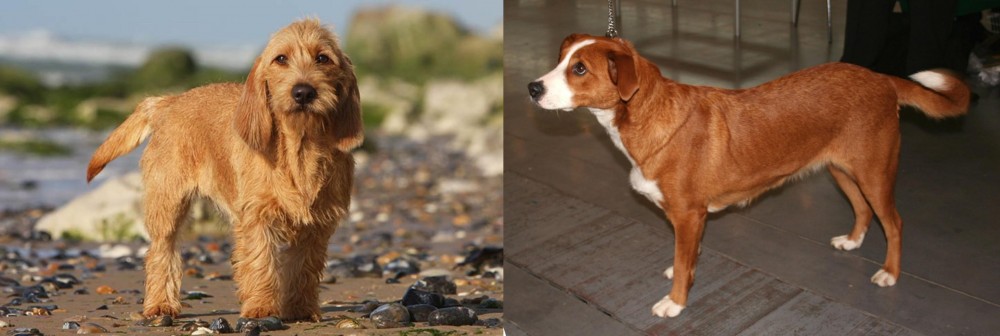 Griffon Fauve de Bretagne is originated from France but Osterreichischer Kurzhaariger Pinscher is originated from Austria. Griffon Fauve de Bretagne may grow 6 cm / 3 inches higher than Osterreichischer Kurzhaariger Pinscher. Both Griffon Fauve de Bretagne and Osterreichischer Kurzhaariger Pinscher are having almost same weight. Both Griffon Fauve de Bretagne and Osterreichischer Kurzhaariger Pinscher has almost same life span. Both Griffon Fauve de Bretagne and Osterreichischer Kurzhaariger Pinscher has same litter size. Both Griffon Fauve de Bretagne and Osterreichischer Kurzhaariger Pinscher requires Moderate Maintenance.
Griffon Fauve de Bretagne is originated from France but Osterreichischer Kurzhaariger Pinscher is originated from Austria. Griffon Fauve de Bretagne may grow 6 cm / 3 inches higher than Osterreichischer Kurzhaariger Pinscher. Both Griffon Fauve de Bretagne and Osterreichischer Kurzhaariger Pinscher are having almost same weight. Both Griffon Fauve de Bretagne and Osterreichischer Kurzhaariger Pinscher has almost same life span. Both Griffon Fauve de Bretagne and Osterreichischer Kurzhaariger Pinscher has same litter size. Both Griffon Fauve de Bretagne and Osterreichischer Kurzhaariger Pinscher requires Moderate Maintenance.
 The Griffon Fauve de Bretagne is one of the oldest scenthounds in France and has always been part of a pack when hunting wolves and wild boar.
The Griffon Fauve de Bretagne is one of the oldest scenthounds in France and has always been part of a pack when hunting wolves and wild boar.
Once wolves started dying out in the 19th century and the dogs were no longer needed, they nearly became extinct. Luckily in 1949, Marcel Pambrun founded the Club de Fauve de Bretagne to bring the breed back from extinction.
Hailing from France, the dog is still used as a hunting dog in the country but is considered rare outside of Europe.
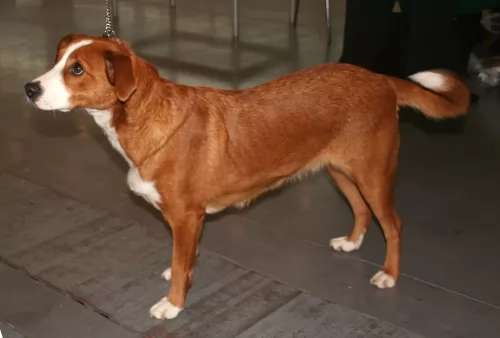 Hailing from Austria, the Osterreichischer Kurzhaariger Pinscher, better known as the Austrian Short-Haired Pinscher has always been depicted on paintings from the Baroque period.
Hailing from Austria, the Osterreichischer Kurzhaariger Pinscher, better known as the Austrian Short-Haired Pinscher has always been depicted on paintings from the Baroque period.
The dog is a terrier-type canine and has always been used as a watchdog but he was also used to hunt because of the terrier qualities he possesses.
This dog has always been used for working on farms. Breeding of this dog started in 1921 and the dog was recognized by the United Kennel Club in 2006.
 Griffon Fauve de Bretagne are medium-sized muscular dogs standing at between 48 to 56cm and weighing in the region of 17 to 21 kg.
Griffon Fauve de Bretagne are medium-sized muscular dogs standing at between 48 to 56cm and weighing in the region of 17 to 21 kg.
The fur of this dog is a tawny, golden, orange shade and is shaggy and coarse, being longer around the face. Known also as the Fawn Brittany Griffon, this scenthound has floppy ears and a long tail carried somewhat up and in a slight curve.
The GFB as he is also sometimes known by, is an affectionate and loyal dog that loves spending time with his human family.
He is a social, friendly dog, and when he is socialized and trained, he becomes even more amicable. He has been bred as a working dog and while he loves to spend relaxing hours indoors, he is essentially a dog that loves to be out and about chasing after prey.
He is alert and intelligent and therefore makes a good watchdog. Your Griffon is energetic and active and will require lots of exercise. He will love coming on walks with you, but this won't be enough and he will require ball- and rope games as well as the chance to join you on your jogging or cycling outings.
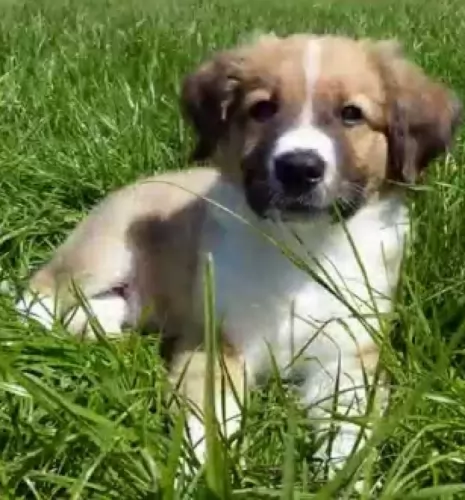 As a medium sized dog, both males and females stand at between 42 and 50cm in height and the dog weighs roughly between 14 and 20kg.
As a medium sized dog, both males and females stand at between 42 and 50cm in height and the dog weighs roughly between 14 and 20kg.
The coat is shortish, dense and smooth and is essentially black and tan with some white, fawn or brindle. The ears of the dog are fairly short and they look as though they wanted to be erect but then decided to be floppy. The nose is black and the eyes dark brown.
The tail is usually docked but when it is left long, it curls over the back. If you want your dog to be bred you can expect between 4 – 6 puppies.
These are playful dogs, getting on well with their human families and wanting to get involved in their activities. They are suspicious of strangers. They are good with kids, making them a good playmate, but they don’t like small children being allowed to climb over them.
They are able to get along well with any other pets in the house. It would be to your benefit to have the dog trained and socialized as he becomes obedient and good around people in social settings. He is an intelligent dog and will find training easy.
They also take their role as guardian and protector seriously.Because he was bred to be a farm dog, he wouldn’t e able to adapt to life on a tiny property in the city.
 You won't find a better canine friend than the Griffon Fauve de Bretagne, once known as the Grand Fauve de Bretagne.
You won't find a better canine friend than the Griffon Fauve de Bretagne, once known as the Grand Fauve de Bretagne.
They have always loved their role as working- and hunting dog but when they're in the company of their human owners, they are loyal and loving, wanting to please.
This good nature of theirs sees them getting on well with other pets in the home as well as with children.Your golden Griffon Fauve De Bretagne is such a friendly, sociable dog and this is what makes him such a popular and sought after family pet.
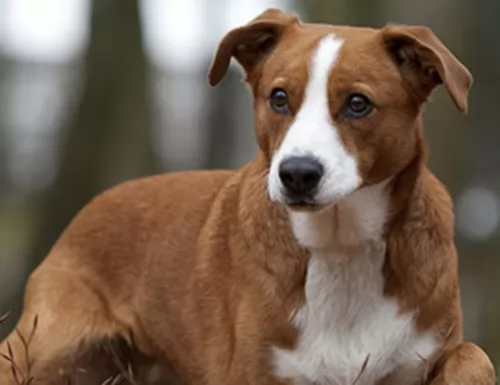 Have your Osterreichischer Kurzhaariger Pinscher trained and socialized if you want him to be amicable and obedient around you and your visitors.
Have your Osterreichischer Kurzhaariger Pinscher trained and socialized if you want him to be amicable and obedient around you and your visitors.
He does well with a human family who are firm, kind and patient with him. He loves to be kept busy with both mental and physical exercise, thriving on challenging activities, and he will become frustrated if he is left day after day just to lie around.
Take him with you on walks, buy him nice chewy, stimulating toys, throw a ball or frisbee with him and include him in your activities.
This is a dog more suited to life in the countryside as opposed to life in the city. Care well for this splendid family pet and you’ll quickly begin to see why dogs like him are known as man’s best friend.
 Capable of reaching 10 to 13 years of age with good care, the Griffon Fauve de Bretagne isn't likely to cause you too much concern with dog illnesses, but there are those common dog illnesses that are worth knowing about because they affect so many dogs.
Capable of reaching 10 to 13 years of age with good care, the Griffon Fauve de Bretagne isn't likely to cause you too much concern with dog illnesses, but there are those common dog illnesses that are worth knowing about because they affect so many dogs.
This is such a common dog ailment that it requires mentioning every time. It's a condition where the hip joint bones don't fit properly, resulting in unnatural wear and tear which ultimately leads to pain and arthritis.
Sometimes it takes a while for the illness to become evident and you'll notice your pet being loathe to take part in the games he loves so much or battling to get up after lying down. It can start in a young dog and will require vet intervention.
Keep an eye on your dog for other common illnesses such as eye diseases, skin allergies and bloat, a disease which can be life-threatening and where the stomach of your dog swells up.
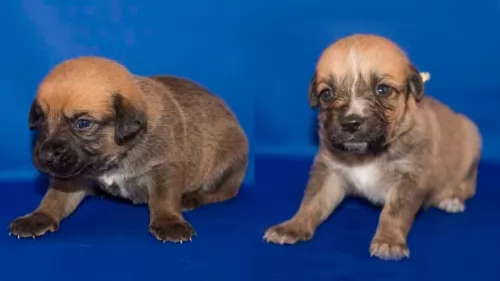 The Austrian Short-haired Pinscher is a robust kind of dog that isn’t going to have you rushing to the vet very often. True, he does have some hereditary health issues but it is highly unlikely that you will find these health issues in your pet.
The Austrian Short-haired Pinscher is a robust kind of dog that isn’t going to have you rushing to the vet very often. True, he does have some hereditary health issues but it is highly unlikely that you will find these health issues in your pet.
Nonetheless it pays to know about one of the more serious conditions -
This is a heart disease that is present from birth and could have been passed down from the parent dog to the puppy. A congenital heart defect occurs as a malformation of any valve, with the most common congenital heart diseases in dogs being patent ductus arteriosus, pulmonic stenosis as well as subaortic stenosis, all potentially inherited defects.
Sometimes a dog can live a fairly normal life with this disease but other times there are complications which can lead to congestive heart failure and atrial fibrillation, causing symptoms such as difficulty with breathing, cough and weakness. Your dog will need to get to the vet to discuss treatment options.
 Your GFB, with his shaggy coat, will need a brush a couple of times a week and nothing much more, being looked upon as a fairly low maintenance breed.
Your GFB, with his shaggy coat, will need a brush a couple of times a week and nothing much more, being looked upon as a fairly low maintenance breed.
He will require you checking inside his ears to ensure he is free of infection. You will need to have his nails trimmed if he doesn't wear them down himself and he will need to have his teeth brushed at least 2 or 3 times a week with special dog toothpaste- and toothbrush.
As a medium sized dog, the Griffon Fauve de Bretagne will need a high-quality dog food full of all the right vitamins and minerals to ensure health and a long life.
He is a hunting dog so you want to make sure that protein is listed high on the ingredients list of his food packaging. You can vary his diet by adding in homemade fare such as cooked chicken, rice and vegetables and you can also try to include some raw meat into his diet too. This raw meat plays an important role in preventing skin allergies.
Never leave him without a bowl of fresh, cool water.
Ensure your 4-legged friend has a nice dry, warm spot with clean blankets to sleep on.
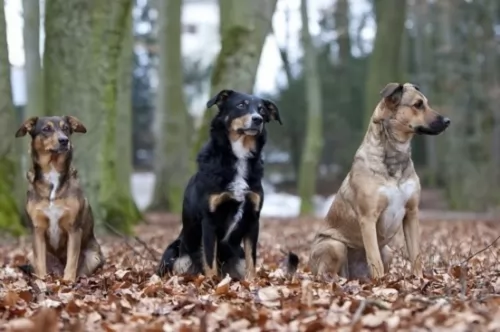 They need quite a lot of exercise, and even though they can adopt to life in the countryside or the city, they will require regular walks, ball- and rope games to prevent them becoming bored, frustrated and destructive.
They need quite a lot of exercise, and even though they can adopt to life in the countryside or the city, they will require regular walks, ball- and rope games to prevent them becoming bored, frustrated and destructive.
The Austrian Short-haired Pinscher sheds quite a bit so he will need to be brushed at least twice a week to remove the loose hairs.
As a medium sized, energetic dog, you want to ensure you maintain your dogs energetic nature by providing him with excellent food.
Choose your commercially manufactured food carefully as some of them are of a poor quality and can actually be detrimental to your dog’s health. Choose a high quality kibble that has quality ingredients.
Home-made food such as boiled chicken, brown rice or pasta and vegetables such as carrots, spinach and sweet potatoes all chopped up and added to his kibble occasionally will do wonders for this dog. He will thrive on also getting in some raw meat from time to time.
Ensure a constant supply of fresh, cool water.